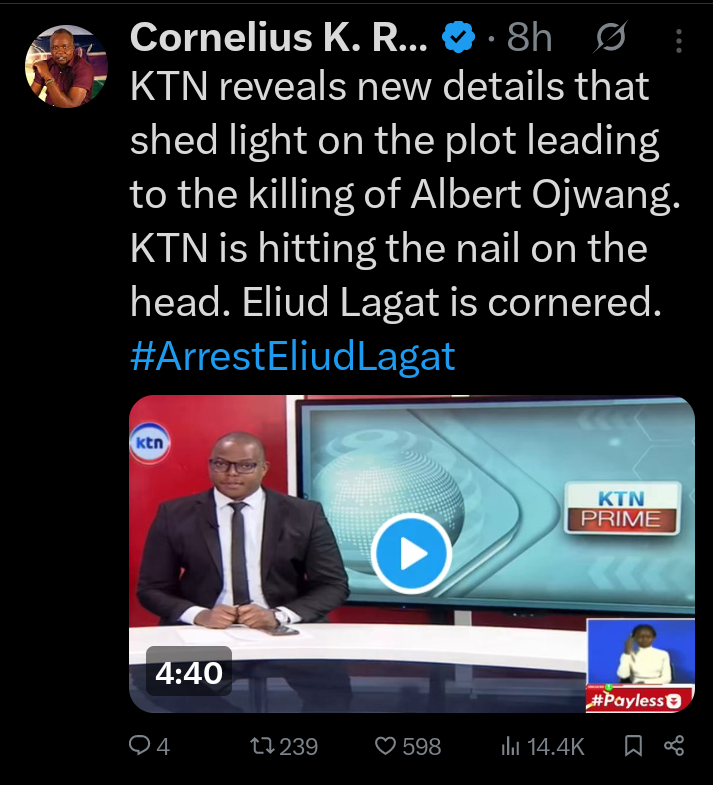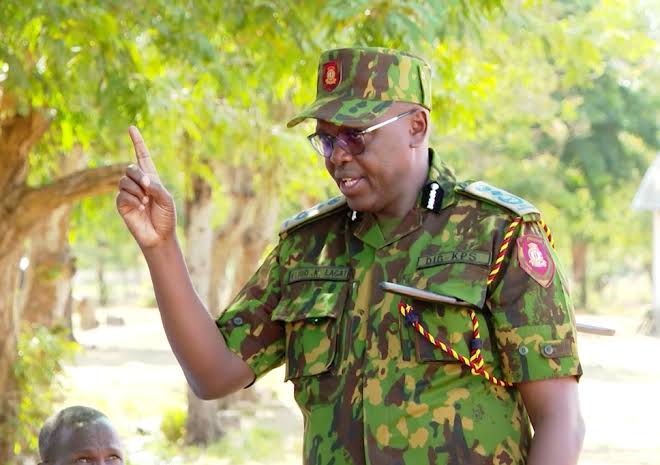Eliud Lagat, the Deputy Inspector General of Police in Kenya, is facing serious allegations after the shocking death of Albert Ojwang, a 26-year-old digital blogger from Homa Bay. Ojwang was arrested on June 7, 2025, for allegedly posting critical messages about Lagat on social media.
He was then taken from Homa Bay to Central Police Station in Nairobi, a journey of over 400 kilometers. A few days later, he was found dead in police custody. The police initially claimed that Ojwang had harmed himself, but an autopsy revealed that he was tortured and strangled.
This discovery sparked outrage across the country, with many accusing Lagat of being directly involved in the arrest and possibly the death of the young blogger.
The situation has been made worse by claims that Lagat may have sent people to target The Standard newspaper, possibly because it had published stories linking him to corruption. Screenshots from KTN News show headlines like “The Mafia Cop!” and “Richest Cop!” which appear to have angered Lagat.
Around the same time, the blogger who had accused him of corruption was arrested and died shortly after. Maverick Aoko, a known X user, posted a video on June 11, 2025, linking Lagat to both the invasion of The Standard and the arrest of Ojwang. Her post, which said “ Whe he marks you, You end up dead,” has caused even more fear and concern among Kenyans who now believe that speaking out against powerful officials may lead to violence or death.

Politicians have not remained silent. Senators like Joe Nyutu and Boni Khalwale have come out strongly, calling for Lagat to resign. Khalwale went as far as saying that people in government need to fear for their positions when they disrespect human life.
These calls were made during a Senate session where Ojwang’s case was discussed. The message was clear abuse of power will not be tolerated. Inspector General of Police Douglas Kanja also confirmed that it was Lagat who made the complaint that led to Ojwang’s arrest.

This confirmation has made things worse for Lagat, who has yet to publicly comment on the matter. Social media has also played a major role in pushing this case into the national spotlight. The hashtag #JusticeForOjwang has trended across platforms, with users demanding that Lagat be arrested and charged. Some have even accused him of being a murderer.
KTN News and other media houses have covered the story in detail, raising concerns about how someone can be taken from their home, locked up, tortured, and killed over a social media post. The National Police Service has said that investigations are ongoing. Five officers, including the Officer Commanding Station at Central Police Station, have been interdicted as part of the probe. But Kenyans are asking why Lagat himself has not been suspended or questioned publicly.
This is not the first time Lagat has faced allegations. In the past, there were unverified reports on social media accusing him of collecting millions each month through corrupt deals. While those claims were never proven, they show that many Kenyans have long doubted his integrity.
The fact that a young man is now dead after clashing with him makes the situation even more serious. The government is now under pressure to act quickly and fairly, not just to bring justice for Ojwang but also to restore public trust in the police.
The case has also brought attention to the rights of bloggers, journalists, and ordinary citizens in Kenya. If someone can be tortured and killed over a post online, then free speech is clearly under threat.





















Add Comment